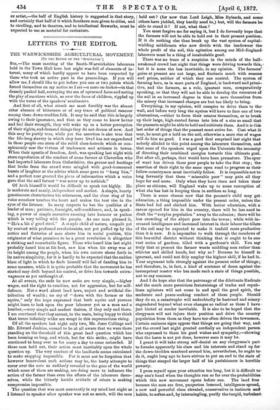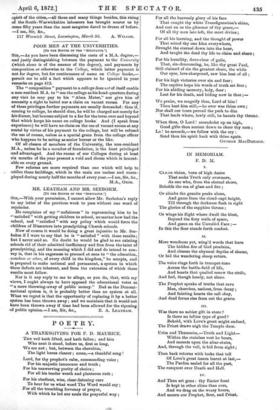LETTERS TO THE EDITOR.
THE WARWICKSHIRE AGRICULTURAL MOVEMENT.
[TO THE EDITOR OF THE SPECTATOR:1
Sns,—The mass meeting of the South-Warwickshire labourers held in the Town Hall here last night was full of elements of in- terest, many of which hardly appear to have been suspected by those who took an active part in the proceedings. If you will allow me, I should like to put before you one or two points which forced themselves on my notice as I sat—a mere on-looker—in that densely packed hall, surveying the sea of upturned faces and noting the play of emotions which, as over the faces of children, rippled up with the turns of the speakers' sentiments.
And first of all, what struck me most forcibly was the almost utter absence of bitterness or of any trace of political rancour among these down-trodden folk. It may be said that this is largely owing to their ignorance, and that as they come to know better and feel their strength, they will wake up to a better perception of their rights, and demand things they do not dream of now. And this may be partly true, while yet the assertion is also true that the life-long slavery in which they have lived has not engendered in these people one atom of the rabid class-hatreds which so con- spicuously mar the virtues of tradesmen and artisans in towns. 'When their apostle of freedom, Arch, was speaking last night with stern reprobation of the conduct of some farmer at Claverdon who had imported labourers from Oxfordshire, the groans and hootings that broke from the crowd were mingled with good-humoured bursts of laughter at the advice which some gave to "hang him," and a perfect roar greeted the piece of information which a voice gave that the said farmer "was never up to nothink."
Of Arch himself it would be difficult to speak too highly. He is moderate and manly, independent and modest. A simple, hearty genuineness characterises his utterances, and the clear ring of his voice somehow teaches the heart and makes the tear rise in the eyes of the listener. In many respects he has the qualities of a leader of men; patience, foresight, sell-confidence, and, in speak- ing, a power of simple narrative running into humour or pathos Which is very telling with the people. As one man phrased it, "He's a bit o' good steel." A simple child of nature, unspoilt yet by contact with professed revolutionists, not yet puffed up by the notice and flatteries of men above him in social position, this originator of what promises to be a great revolution is altogether a striking and remarkable figure. Those who heard him last night probably heard him at his best, saw him when his sway was at its height among the people, when his own nature shone forth in its native simplicity, for it is hardly to be expected that the sudden blaze of light in which he finds himself will fail of dazzling him to some measure, while it is quite probable that the movement he has started may drift beyond his control, or drive him towards extra- vagances as yet unthought of.
At all events, the ends he now seeks are very simple,—higher wages, and the right to combine, not for aggression, but for self- defence. Not a word about land laws, unjust and artificial dis- tribution of wealth ; no cry of "down with the farmer or the squire," only the hope expressed that both squire and yeoman might learn to look upon the poor labourer yet as a man and a brother,—very simple and modest desires, if they only end there. I am convinced that they cannot, in the main, being happy to think that issues infinitely wider are wrapt in this unpretentious rising.
Of all the speakers last night only two, Mr. Jesse Collings and Mr. Edward Jenkins, seemed to be at all aware that we were there standing on the threshold of this great land question which has been looming so long, and which, but for this strike, might have continued to hang over us for many a day to come unheeded. If these men hold out, their action must inevitably open the whole question up. The very conduct of the landlords seems calculated to make stopping impossible. For it must not be forgotten that however benevolent such actions may be, the hasty attempts to cover over the sore so suddenly revealed to the gaze of the world which some of them are making, are doing more to influence the action of the farmer than even the efforts of the labourers them- selves, while the bitterly hostile attitude of others is making compromise impossible.
The question that was most constantly in my mind last night as I listened to speaker after speaker was not so much, will the men hold out ? (for now that Lord Leigh, Miss Rylands, and some others have yielded, they hardly need to,) bat, will the farmers be' able to stand it? If not, what then ?
You must forgive me for saying it, but I do fervently hope that- the farmers will not be able to hold out in their present position.. If it do nothing else than break up the vast system of capital- wielding middlemen who now divide with the landowner the. whole profit of the soil, this agitation among our Mid-Englandi labourers must be a thing of incalculable good.
There was no trace of a suspicion in the minds of the half- awakened crowd last night that things were driving towards this, - but it is none the leas inevitable, in my opinion. The farmers' gains at present are not large, and fluctuate much with seasons and prices, neither of which they can control. The system of farming here, as in most parts of England, is backward and primi- tive, and the farmers, as a rule, ignorant men, comparatively speaking, so that they will not be able to develop the resources of the soil in an increased degree in time to save themselves from. the misery that increased charges are but too likely to bring.
Everything, in my opinion, will conspire to drive them to the' wall, and before very long the squires will have to face one of two alternatives, —either to farm their estates themselves, or to break up their large, high-rented farms into lots of a size so small that the peasants might be able to hold and cultivate them. And it is this- last order of things that the peasant must strive for. Cost what it may, he must get a hold on the soil, otherwise a mere rise of wages will do him no good. I was a good deal surprised last night that. nobody alluded to this point among the labourers themselves, and that none of the speakers urged upon the Unionists the necessity/ of directing their combined energies towards this ultimate goal.. But after all, perhaps, that would have been premature. The spur- of want has driven these poor people to take the first step ; the - assertion of their right to the same open road to progress as their fellow-countrymen must inevitably follow. It is impossible not to long fervently that these "miserable poor" may gain all they hope for and more. Only when they have risen and taken their- place as citizens, will England wake up to some conception of; what she has lost in keeping them in serfdom so long.
There is some chance now that the peasant's child may get education, a thing impossible under the present order, unless the State had fed and clothed him. With better education, with a.- career opened for him in the country, there will be less need to- draft the "surplus population" away to the colonies ; there will be less crowding of the abject poor into the towns ; while with in- creased intelligence and increased interest in their labour the tillera- of the soil may be expected to make it tenfold more productive. than it is now. It is impossible to walk through the meadows of this beautiful district without thinking that it ought to be one vast series of gardens, tilled with a gardener's skill. You say truly that at present the farmer wants middling men rather than, athletes and skilled hands, but why so ? Because he himself is. ignorant, and could not fitly employ the highest skill, if he had it.. Your argument tells strongly against the present order of things and therefore, is, in fact, a kind of sentence of doom against the, incompetent master who has made such a state of things possible,. not to say common.
And I do hope also that the patronage of the dilettante Radicalsz and the much more pernicious fraterniaings of trades and repub- lican agitators will not come in and spoil the good spirit, the moderate and peace-seeking conduct of these people. Shoul& they do so, a catastrophe will undoubtedly be hastened and misery, engendered beyond what even changes so radical as those I have just hinted at render inevitable. It is also to be hoped that the- clergymen will not injure their position and drive the country population from them as they have too often driven the townsmen.. Certain ominous signs appear that things are going that way, and yet the crowd last night greeted cordially an independent parson. who expressed to them his good wishes and sympathy,—showing that the harm is not yet done, however soon it may be.
I grant it will take strong self-denial on any clergyman's part to forsake apparently his class and his interests and stand up for- the down-trodden manhood around him, nevertheless, he ought to- do it, ought long ago to have striven to put an end to the state of' things that steeped the larger half of his parishioners in horrible- poverty.
I press myself upon your attention too long, but it is difficult to- day one's hand when the thoughts run so far over the probabilities. which this new movement opens before one. The land free because the men are free, pauperism lessened, intelligence spread, a new and powerful class elevated, conservative in instincts and habits, to soften and, by intermingling, purify the turgid, turbulent spirit of the cities,—all these and many things besides, this rising of the South-Warwickshire labourers has brought nearer us by some fifty years than the most sanguine dared to dream of before. —I am, Sir, &c., 117 Warwick Street, Leamington, March 30. A. WILSON.



































 Previous page
Previous page